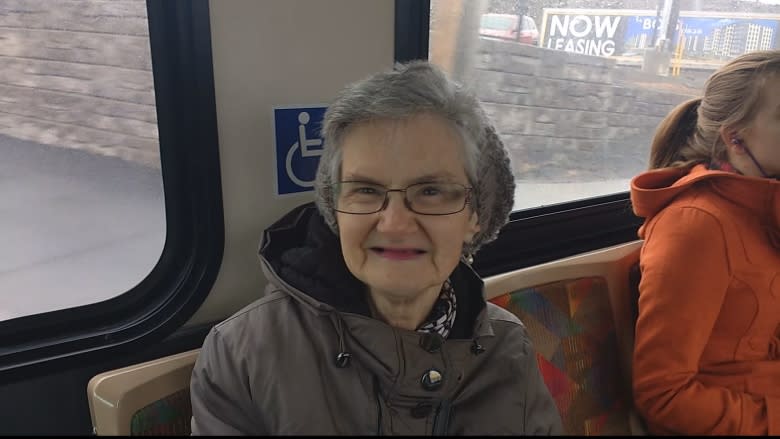End of the road looms for one of Halifax's first female bus drivers
It was almost three decades ago that Linda Cruickshank first took a seat behind the wheel of a Metro Transit bus.
One of just a few female drivers, it took her a while to fit in. But before long, Cruickshank became known and liked by both co-workers and passengers.
Now a 28-year veteran, she's planning her retirement in December. Cruickshank says she'll miss working with and helping the public.
Her favourite things about the job?
"It's the people visiting the city and hearing how much they love it," Cruickshank says.
During her 15-minute break, Cruickshank knits. She says she occasionally hands out the finished projects to her regulars.
As she pulls back onto the road, a car stopped at the lights at Upper Water and Duke streets blocks her from merging with the rest of traffic.
"He's got my space," Cruickshank says, sighing without getting irritated.
She's seen the out-of-province plates and says he probably doesn't know where he's going.
A good income
When Cruickshank started in 1990, she was a single mother with three teenage daughters. The money she could get driving the bus allowed her to provide for them.
"The wages were good … back then even!"
When she first applied for the job, Cruickshank says her real dream was to drive a tractor-trailer.
"I was never brave enough," she says.
Few female drivers
Still, Metro Transit — now called Halifax Transit — had its own challenges. The workplace was almost entirely male and Cruickshank says she had to prove herself to them.
"Coming in, I was scared to death," Cruickshank remembers.
Being able to joke with her co-workers was an important part of gaining their acceptance. Once she had accomplished that, she says, "the guys took me under their wing and it was a really good experience."
There have been a lot of changes in transit since she began, Cruickshank says. Many more women have been hired, there are more routes and traffic and road rage are worse now.
The biggest improvements according to Cruickshank? Power steering and air conditioning.
But one thing has remained the same: her relationship with the public.
'This is my social life'
It's the thing she says she'll miss the most when she retires.
Cruickshank says she has lots of regulars, some of whom she's known for years. She also says she's been driving the bus long enough to see multiple generations of some families.
"They bring their children on the bus now and [it makes me realize] I'm getting old."
Remembering how much she missed her customers when she had to stop driving last year as a result of shoulder surgery, Cruickshank says, "I won't say I was depressed all the time, but it wasn't the social life I wanted to have."
She waves to pedestrians and other drivers as she passes them. This cheerful disposition has helped Cruickshank garner a few nicknames over the years, including Mama Transit.
"This is my social life," she says of interacting with passengers and work colleagues.
One frequent passenger is Sharon Pye. When Pye climbs onto the 4 at Mumford Terminal, Cruickshank is surprised to see her.
Pye guesses she's been riding on Cruickshank's routes for about five years. Both women remember the first time they met.
An older man Cruickshank jokingly called her boyfriend rode her route regularly. One day he boarded and Cruickshank greeted him as she usually did.
"I said, 'Oh ladies, look what we've got here. Here comes my boyfriend!'"
She remembers Pye responding, "That's my husband!"
That moment was the genesis of the friendly relationship between the two women. Today, Pye says she considers Cruickshank a good friend.
Cruickshank knows this isn't Pye's normal route. She knows enough about Pye to guess that she might be heading to church.
Sure enough, Pye says she's heading to church today.
Helping students
While Cruickshank loves the seniors who ride her bus, there's another type of passenger she takes special care of.
"The students, sometimes they lose their passes or they forget them. … First thing I'll do is tell them, 'You're still going to school,'" Cruickshank says, drawing on her own experience as a mother.
She knows her regular primary, high school and university students and does what she can to help them.
"If they're running for the bus, I'll wait for them. Because they're going to school!"
9/11 'still brings tears'
Cruickshank describes dealing with airplane passengers in the immediate aftermath of 9/11 as one of the most unforgettable and difficult moments of her nearly 30-year career.
"It still brings tears," she says, trying to maintain composure.
Bus drivers were responsible for taking delayed passengers from the airports to secondary locations following the attacks on New York.
The problem, Cruickshank says, was none of the drivers knew how to help the frightened, stranded passengers.
"9/11 took a lot out of us … because we didn't have answers for people," says Cruickshank, adding that she still thinks about it.
Cruickshank and her boyfriend will both be retiring this year. She says he's begun to count down the days until his retirement and they've made a bucket list of things to do once they're finished working. One of the items on the top of their list is a trip to Newfoundland.
Cruickshank says she's looking forward to her retirement.
"But it doesn't mean I won't be missing the bus, because I still will."



